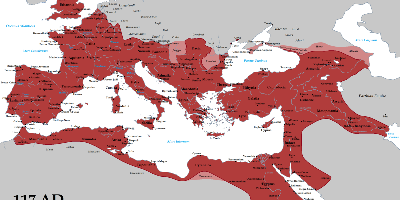1 gen 63 anni a. C. - Consulship of Cicero
Descrizione:
Cicero, seizing the opportunity offered by optimate fear of reform, was elected consul for the year 63 BC; he was elected with the support of every unit of the centuriate assembly, rival members of the post-Sullan establishment, and the leaders of municipalities throughout post-Social War Italy. His co-consul for the year, Gaius Antonius Hybrida, played a minor role.He began his consular year by opposing a land bill proposed by a plebeian tribune which would have appointed commissioners with semi-permanent authority over land reform. Cicero was also active in the courts, defending Gaius Rabirius from accusations of participating in the unlawful killing of plebeian tribune Lucius Appuleius Saturninus in 100 BC. The prosecution occurred before the comita centuriata and threatened to reopen conflict between the Marian and Sullan factions at Rome. Cicero defended the use of force as being authorised by a senatus consultum ultimum, which would prove similar to his own use of force under such conditions.
Most famously—in part because of his own publicity—he thwarted a conspiracy led by Lucius Sergius Catilina to overthrow the Roman Republic with the help of foreign armed forces. Cicero procured a senatus consultum ultimum (a recommendation from the senate attempting to legitimise the use of force) and drove Catiline from the city with four vehement speeches (the Catiline Orations), which to this day remain outstanding examples of his rhetorical style. The Orations listed Catiline and his followers' debaucheries, and denounced Catiline's senatorial sympathizers as roguish and dissolute debtors clinging to Catiline as a final and desperate hope. Cicero demanded that Catiline and his followers leave the city. At the conclusion of his first speech, Catiline hurriedly left the Senate, (which was being held in the Temple of Jupiter Stator). In his following speeches, Cicero did not directly address Catiline. He delivered the second and third orations before the people, and the last one again before the Senate. By these speeches, Cicero wanted to prepare the Senate for the worst possible case; he also delivered more evidence, against Catiline.
Catiline fled and left behind his followers to start the revolution from within while he himself assaulted the city with an army of "moral bankrupts and honest fanatics". It is alleged that Catiline had attempted to involve the Allobroges, a tribe of Transalpine Gaul, in their plot, but Cicero, working with the Gauls, was able to seize letters that incriminated the five conspirators and forced them to confess in front of the senate. The senate then deliberated upon the conspirators' punishment. As it was the dominant advisory body to the various legislative assemblies rather than a judicial body, there were limits to its power; however, martial law was in effect, and it was feared that simple house arrest or exile – the standard options – would not remove the threat to the state. At first Decimus Junius Silanus spoke for the "extreme penalty"; many were swayed by Julius Caesar, who decried the precedent it would set and argued in favor of life imprisonment in various Italian towns. Cato the Younger rose in defense of the death penalty and the entire Senate finally agreed on the matter. Cicero had the conspirators taken to the Tullianum, the notorious Roman prison, where they were strangled. Cicero himself accompanied the former consul Publius Cornelius Lentulus Sura, one of the conspirators, to the Tullianum.
Cicero received the honorific "pater patriae" for his efforts to suppress the conspiracy, but lived thereafter in fear of trial or exile for having put Roman citizens to death without trial. While the senatus consultum ultimum gave some legitimacy to the use of force against the conspirators, Cicero also argued that Catiline's conspiracy, by virtue of its treason, made the conspirators enemies of the state and forfeited the protections intrinsically possessed by Roman citizens. The consuls moved decisively. Antonius Hybrida was dispatched to defeat Catiline in battle that year, preventing Crassus or Pompey from exploiting the situation for their own political aims.
After the suppression of the conspiracy, Cicero was proud of his accomplishment. Some of his political enemies argued that though the act gained Cicero popularity, he exaggerated the extent of his success. He overestimated his popularity again several years later after being exiled from Italy and then allowed back from exile. At this time, he claimed that the republic would be restored along with him. Many Romans at the time, led by Populares politicians Gaius Julius Caesar and patrician turned plebeian Publius Clodius Pulcher believed that Cicero's evidence against Catiline was fabricated and the witnesses were bribed. Cicero, who had been elected consul with the support of the Optimates, promoted their position as advocates of the status quo resisting social changes, especially more privileges for the average inhabitants of Rome.
Shortly after completing his consulship, in late 62 BC, Cicero arranged the purchase of a large townhouse on the Palatine Hill previously owned by Rome's richest citizen, Marcus Licinius Crassus. It cost an exorbitant sum, 3.5 million sesterces, which required Cicero to arrange for a loan from his co-consul Gaius Antonius Hybrida based on the expected profits from Antonius's proconsulship in Macedonia. At the beginning of his consulship, Cicero had made an arrangement with Hybrida to grant Hybrida the profitable province of Macedonia that had been granted to Cicero by the Senate in exchange for Hybrida staying out of Cicero's way for the year and a quarter of the profits from the province. In return Cicero gained a lavish house which he proudly boasted was "in conspectu prope totius urbis" (in sight of nearly the whole city), only a short walk away from the Roman Forum.
Aggiunto al nastro di tempo:
Data:
1 gen 63 anni a. C.
Adesso
~ 2090 years ago
